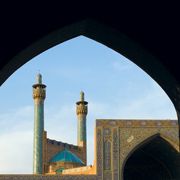Annual John Gandel Symposium Analyzes a Region in Turmoil
The annual John Gandel Symposium, now in its tenth year, drew an animated audience to hear from experts on the ongoing unrest in the Middle East and the resulting challenges for Israel and governments throughout the region.
Moderated by Prof. Uzi Rabi, Director of the Moshe Dayan Center for Middle Eastern and African Studies, this year’s panel included Danny Ayalon, former Israeli Ambassador to the United States and former Deputy Foreign Minister of Israel; Prof. Itamar Rabinovich, former TAU President and Israeli Ambassador to the United States; and Prof. Shimon Shamir, former Israeli Ambassador to Egypt and Jordan.
Prof. Rabi opened with a dramatic depiction of a severely unstable Middle East resulting from the Arab Spring, which has deposed many iron-fisted dictators and regimes that have typified the region for the past 60 years. “Where the cards will fall is still unknown, which presents a huge challenge to the citizens, states and societies of the region. Regional orders have been upturned, and the paradigms of yesterday are finding their way into the dustbins of history,” Prof. Rabi said.
Watch Prof. Rabi’s opening remarks >>
Mega-trends and opportunities
Danny Ayalon began by addressing the two “mega-trends” affecting world current affairs – economic integration and political disintegration – and the implications of these phenomena on Israel’s security and regional stature.
Ayalon emphasized that, as a technological power defined by a spirit of innovation and creativity, Israel has managed to achieve a unique “cross-pollination between academy, industry and innovators.” Ayalon opined that this technological might is translated into political power, particularly on the bilateral level – “because we have something to bring to the table with countries like China, who need and want our technology.”
While globalization and economic integration present Israel with the means to exert influence on the global stage, political disintegration – the other phenomenon that Ayalon cited as defining the world today – also plays into Israel’s hands, as there is no clear alliance of Arab countries that can coalesce against the Jewish state. The downside, Ayalon remarked, was that the weakening of the region’s centralized governments is leading to the breakdown of longstanding security arrangements on Israel’s borders, particularly along the Golan Heights and Sinai frontier.
On Iran, Ayalon stated that he doesn’t think the Iranians will become a nuclear power, primarily due to international pressure – implying that the increasing isolation of the regime coupled with its internal problems will force it to abandon its drive towards nuclear weaponization. Regarding the Palestinian issue, Ayalon, traditionally seen as a hawk, asserted his belief that “it is very much in Israel’s interest to bring this conflict to finality, and I think that the two-state solution is agreed upon by everyone, including the Likud, whether they say so or not. The only question is the price and the road to get there.”
Watch Amb. Ayalon’s presentation >>
A disintegrating Syria
Israel’s former chief negotiator to Syria in the 1990s, Prof. Itamar Rabinovich, was next to take the podium, providing an intriguing analysis of the country’s civil war. He compared the two year-long conflict to the Spanish Civil War of the 1930s, whereby external actors played a critical part in the conflict. In the case of Syria he stated that outside forces – namely the West on the one hand, and Russia, Iran and the Hezbollah on the other – are playing a key role in the internal political conflict raging in Syria. With all Arab eyes now on Syria, Rabinovich stated that the future of the Arab Spring would be largely determined by the outcome of the Syrian Civil War. He hypothesized that the most likely outcome would be a protracted conflict similar to that seen in Iraq, characterized by sectarian violence and the weakening of central state authority.
Highlighting the interests of two pro-Assad countries – Russia and Iran – Rabinovich stressed that Russian President Vladimir Putin is committed to preserving the Syrian regime, viewing its replacement with a pro-western government as untenable. Putin’s decision to supply the Assad regime with advanced weapons systems testifies to this, resulting in a “dangerous regional and international game” in which Israel is threatening to destroy such sophisticated weaponry upon its delivery to the Assad regime. Rabinovich also addressed Iran’s investment in Syria, with the regional power intent on preserving Syria as a land bridge that connects Iran and its proxy Hezbollah in Lebanon.
Rabinovich proceeded to offer three major scenarios for the outcome of the Syrian Civil War. The first is that the regime emerges victorious – even though it would take years to reestablish control over the entirety of the country. The second scenario, which Rabinovich declared the least likely, is an opposition triumph, where Assad is “chased out of his palace in Damascus,” withdrawing to his coastal Alawite heartland. Finally, and what Rabinovich deemed the most likely, is that the civil war will continue for years, similar to the situation in Iraq. He concluded that all three scenarios entail both risks and opportunities for Israel, and that “we can only pray that the Israeli government will have the wisdom to manage itself successfully in these complex situations.”
Watch Prof. Rabinovich’s presentation >>
Egypt on the edge
Prof. Shimon Shamir, Israel’s third ambassador to Egypt between 1988 and 1990, analyzed the similarly tumultuous situation in Egypt. He argued that although the Egyptian uprising – and indeed the entire Arab Spring – is considered by many to be driven primarily by popular thirst for democracy, ethnic and religious rivalries are also key drivers of the violence engulfing the Middle East.
Shamir discussed the internal challenges facing Egypt, highlighting its political instability, economic malaise, breakdown of law and order, lack of natural resources, and a inability to manage its commercial interests in a globalized market. He drew attention to the sectarian violence between Muslims and Christians in the country, stating that “the Copts are in a mood of despair – tens of thousands are emigrating because they feel that they have no future under an Islamist government”. Of all these challenges gripping Egypt, Shamir identified the economy as the most pressing concern, and cited greater openness and productivity in the technological, industrial and academic realms as the most effective means to strengthen Egypt’s economic position.
In addition to the economic challenges, Shamir listed three key challenges now facing the Morsi administration: the opposition, which accuses Morsi of being dictatorial and implementing an Islamization of state and society; the judiciary, which is stacked with anti-Morsi judges who served during the Mubarak era; and the military, which refuses to get involved in domestic rivalries between the country’s competing political forces. As a result of these difficulties, Shamir asserted that Morsi is not as strong as many consider him to be, and that much of Israel’s apprehension at the fall of Mubarak has turned out to be misguided. The peace treaty remains intact, security cooperation continues, and Hamas is seen as a threat by Egypt, not as a natural ally.
Watch Prof. Shamir’s presentation >>
The symposium concluded with a vibrant Q&A session, during which issues such as the recent Turkish protests, the waning strength of Hamas and the Iranian threat were broached.
Established in 2003 by TAU Honorary Doctor John Gandel of Australia – esteemed businessman, philanthropist and devoted friend of Israel – the annual symposium is one of the most popular events held in the framework of the TAU International Board of Governors meeting, offering TAU Governors the unique opportunity to gain first-hand insights from Middle East experts.






